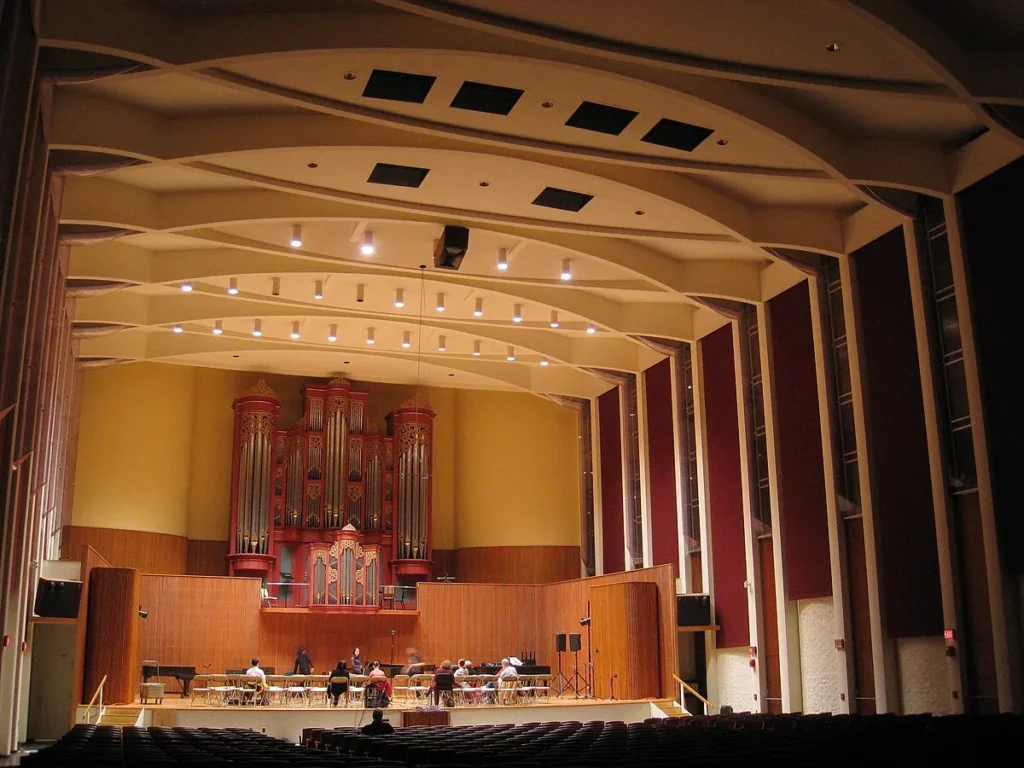
Oberlin Conservatory, the oldest continuously operating conservatory in the United States, is a world-renowned breeding ground for exceptional musical talent. Awarded the prestigious National Medal of Arts in 2009, Oberlin boasts a unique focus on undergraduate music education, preparing students for remarkable careers as performers, composers, and leaders in the world of music.
Immersed in music from day one, Oberlin students thrive in an environment of high expectations and artistic risk-taking. Described by the New York Times as a “rural experimental haven,” Oberlin provides unparalleled opportunities for intensive study and immersive performance experiences. From national and international tours to live-streamed concerts and recordings on the conservatory’s own label, Oberlin students are showcased on the world stage, garnering acclaim from top critics and discerning audiences alike.
Oberlin’s legacy is etched in the achievements of its alumni. Grammy Award-winning ensembles like Eighth blackbird and the International Contemporary Ensemble, along with renowned early music groups Apollo’s Fire and Rebel, all credit their beginnings to Oberlin. The conservatory has also nurtured the talents of acclaimed string quartets like Pacifica and Miró, exceptional soloists like Jennifer Koh, and Pulitzer Prize-winning composers like Christopher Rouse and George Walker. Jazz saxophonist and author James McBride, Atlanta Symphony Orchestra Music Director Robert Spano, and MacArthur Award-winning pianist Jeremy Denk are just a few more examples of the extraordinary artists who have emerged from Oberlin.
Uniquely situated on the campus of a renowned liberal arts institution, Oberlin pioneered the double degree nearly 100 years ago. This innovative short term program allows students to pursue music alongside other disciplines, opening doors to diverse professional possibilities after graduation. Forty new conservatory students each year choose this path, combining their passion for music with the intellectual rigor of academia.
Creativity & Leadership: Entrepreneurship at Oberlin empowers students to take their innovative ideas and turn them into reality. This multidisciplinary initiative fosters a culture of thoughtful risk-taking, providing funding, coaching, and other resources to help students launch ventures, both artistic and otherwise, preparing them for a world where creativity and leadership are essential for success.
Student Cohort Size
Oberlin College’s student population is diverse and well-rounded, with a strong representation of both the arts and sciences. 11.22% of the total student population pursues studies at the Conservatory of Music. A smaller group of students (6.63%) are enrolled in the double degree program, which combines rigorous coursework in both the arts and sciences.
Oberlin Conservatory boasts a diverse student body of approximately 540 students, including 180 pursuing double-degree programs that combine their passion for music with rigorous academic study in other disciplines. This unique blend of artistic and intellectual pursuits fosters a vibrant and enriching learning environment where students can explore their creative potential while developing a well-rounded education. The conservatory’s commitment to undergraduate music education ensures that students receive the personalized attention and guidance they need to thrive in their chosen field.
Gender diversity is also evident at Oberlin, with females accounting for 59.14% of the student body and males making up 40.86%. Additionally, 9.85% of students identify as international, bringing a global perspective to the campus community. With a total undergraduate enrollment of 2,986, Oberlin College fosters a dynamic and enriching learning environment for students from all backgrounds and academic interests.
Four-Year Completion Rate
The graduation rate is among the most important factors when selecting a college. Oberlin College’s first-year retention rate is 86.6%. This means that 86.6% of first-year students continue their education for their sophomore year and beyond. The 4-year graduation rate is 83.2%. This implies that 83.2% of students were able to graduate after 4 years.
Student-to-Faculty Ratio
Oberlin College is committed to providing a personalized and engaging learning experience for its students, as evidenced by its low student-to-faculty ratio of 6:1. The small class sizes foster a collaborative learning environment where students feel comfortable asking questions, sharing ideas, and engaging in critical thinking.
Admissions
Acceptance Rate
Out of the 1,240 aspiring musicians who applied to Oberlin Conservatory, only 430 were fortunate enough to receive an acceptance letter. This highly competitive acceptance rate of 34.6% reflects the conservatory’s rigorous admissions standards and its reputation for attracting exceptional musical talent. Gaining admission to Oberlin Conservatory is a significant accomplishment, signaling the potential for a promising future in the world of music.The Early Decision program is popular among applicants, with 32% of enrolling students being admitted through this route.
Oberlin’s student body is geographically diverse, with students from 43 states and 46 countries. The college also attracts a strong academic profile, with 64% of students ranked in the top 10% of their high school class.
Also Read: San Diego Colleges
Acceptance GPA
Oberlin Conservatory boasts a highly selective admissions process and the average GPA of admitted students is higher than 3.8.
Types of Admission
The Conservatory of Music does not offer an Early Action or Early Decision option. All applicants will be considered Regular Review applicants.
Application Components
All required parts of the Common Application
Secondary school report and high school transcript: The transcripts will be sent by your school counselor.
SAT or ACT scores: While test scores are optional for students applying for fall 2023 and fall 2024, the average SAT scores for admitted students were between 1360 and 1530, and the average ACT scores were between 30 and 33.
Music Teacher Recommendation Request: Requests for music teacher recommendations are to be completed through the Applicant Portal. Recommendations are not requested through the Common Application and cannot be submitted using Naviance. The Conservatory requires two recommendations from persons who can write about the applicant’s musical abilities and experiences. At least one of the two recommendations should come from your current or most recent private studio teacher, with the second being a chamber music coach, conductor, school or orchestra band director, etc.
Audition/Interview Request: Attending an in-person audition at Oberlin College offers distinct advantages. It provides an opportunity to engage with faculty, connect with current students, and gain a firsthand impression of the campus environment, helping you determine if Oberlin is the ideal fit for your academic and personal aspirations. While a recorded audition remains a viable option, an in-person audition enhances your ability to showcase your musical talents and engage with the Oberlin community.
Music Theory Exam: As part of the application and audition evaluation process, the admissions committee considers your music theory knowledge. Your Applicant Portal will contain a link to complete our online Music Theory Exam. The theory test deadline is February 1. This test will also serve as a basic placement test for the Division of Music Theory should you be admitted to Oberlin and choose to enroll. Students who achieve a high score will be invited to take additional tests in theory during the summer for possible placement in a more advanced class.
Academics
Oberlin Conservatory, a haven for aspiring musicians, cultivates exceptional performers and composers through its diverse range of majors, encompassing historical performance to electronic music. With 42 areas of private study available, students receive personalized instruction tailored to their unique musical aspirations. Oberlin Conservatory nurtures raw talent into disciplined professionals, empowering them to make a lasting impact on the world of music.
Performance is an integral thread in Oberlin’s tapestry, woven into the very fabric of student life. Each year, an exceptional 500 concerts spanning five centuries of music are presented by students, faculty, and renowned guest artists. With over two dozen large ensembles and a thriving small-ensemble culture, students have ample opportunities to showcase their talents and hone their performance skills in a diverse range of musical styles, both on campus and on stages around the globe.
Special Academic Programs
Double Degree Program:
Oberlin Conservatory stands unique among major music schools, seamlessly integrating its campus with a renowned liberal arts college. This exceptional arrangement allows students to pursue both a Bachelor of Music degree from the conservatory and a Bachelor of Arts or Bachelor of Science degree from the college in as few as five years. This dual-degree program fosters a holistic educational experience, nurturing both artistic and intellectual growth.
Cost of Attendance
Tuition $63,700
Housing $9,398
Food $9,544
Fees $946
Total $83,588
Estimated Expenses
Books $930
Personal Expenses $978
Travel varies
At Oberlin, music is not just a passion, it’s a foundation for future generations of artistic leaders. With its unparalleled focus on undergraduate music education, its tradition of excellence, and its forward-thinking approach to education and career development, Oberlin Conservatory remains a beacon of inspiration for young musicians around the world.
Embark on a transformative higher education journey and elevate your path to academic success with the expert guidance and personalized support of an Ivy Central college counselor.






